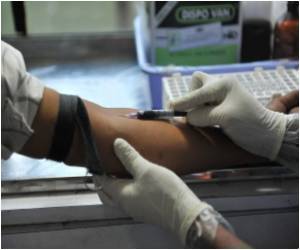
"What we might be measuring is an accumulated barometer of your life of exposures that then put you at risk," said Marsit, assistant professor of medical science in the Department of Pathology and Laboratory Medicine at the Warren Alpert School of Medicine at Brown University. "Will you ever really figure out if eating something when you were 12 gave you cancer? Instead we can use these kinds of markers as an integrated measure of your exposure history throughout your life."
Prediction or early detection?
To create the test, Marsit's team of scientists at Brown and Dartmouth studied the blood of 112 people who had bladder cancer and 118 who didn't. That gave them the tell-tale pattern of methylation to look for in immune system cells in the blood. Then, under properly blind conditions, they applied that test to the blood of a similar number of people who either had the cancer or didn't, and made their predictions.
They found that they could indeed determine who had the cancer and who didn't, based solely on the methylation pattern they observed. Controlling for the exposure to known risk factors like smoking that the patients reported, the researchers saw that people with the methylation pattern were 5.2 times more likely to have bladder cancer than people who did not have the pattern.
Because the samples used in the study came from people who already had the cancer, Marsit acknowledged that the scientists cannot be sure without further research whether the methylation markers in their immune system cells were predictors of cancer (i.e., they were present before the cancer began growing, as the team's hypothesis suggests) or simply indicated that the cancer was already there (i.e., they are a consequence of the cancer).
Advertisement
The researchers in the paper write that testing for methylation in blood cells could also be similarly applicable to other cancers.
Advertisement















